|
|
|
Sort Order |
|
|
|
Items / Page
|
|
|
|
|
|
|
| Srl | Item |
| 1 |
ID:
101066
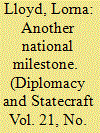

|
|
|
|
|
| Publication |
2010.
|
| Summary/Abstract |
Ten days after announcing its candidature, and amidst some surprise, Canada was elected to a non-permanent seat on the Council of the League of Nations. This article will show how and why this came about. In so doing, it will demonstrate that Canada's election was an important episode from several perspectives. First, it was a milestone in Canada's gradual international coming of age, confirming that it was entitled to all the rights and responsibilities of League membership. Second, it was a significant step in the development of the Commonwealth into an association of equals. And, third, it contributed to the gelling of the emerging group system in elections to the League Council.
|
|
|
|
|
|
|
|
|
|
|
|
|
|
|
|
| 2 |
ID:
101065
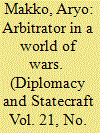

|
|
|
|
|
| Publication |
2010.
|
| Summary/Abstract |
The League of Nations is primarily remembered for its failures in the 1930s. Indeed, the established perception of its history usually emphasizes weaknesses. Failing to settle the question of which Power should possess the former Ottoman province of Mosul after the First World War, Turkey saw the dispute addressed to the League in summer 1924. Within a short time, a multi-leveled negotiation process that involved a large number of politicians, diplomats, and lawyers was put in motion. Sixteen months and many crises later, the League Council awarded the entire Mosul province to Iraq. The arbitration had been based upon data collected by two enquiry commissions comprising representatives from eight different Powers, the work of both numerous mediators, and a Council sub-committee. Though certainly not perfect, the League's role averted war and renewed disaster.
|
|
|
|
|
|
|
|
|
|
|
|
|
|
|
|
| 3 |
ID:
101063
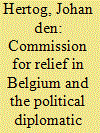

|
|
|
|
|
| Publication |
2010.
|
| Summary/Abstract |
During the First World War, the Commission for Relief in Belgium (CRB) supplied occupied Belgium with food, provoking discord between military and political leaders on both sides. The CRB's work undermined the Allies' economic blockade of the enemy, attracting military criticism. In Germany, politicians favoured sustaining the food supply to prevent unrest, whilst the Army wanted to exploit Belgium's resources. From 1916 onwards, the CRB became a bone of contention in Germany in the dispute between military and political leaders about unrestricted submarine warfare. It also loomed large in the political and military debate about the attitude to neutral countries: the Allies wanted them to brave the German threat and cooperate with the blockade policy-otherwise, food imports from Allied countries would be forbidden. Tonnage and food for the CRB were incorporated into the negotiations with neutral countries about their imports and the use of home-grown produce. The debates about the CRB thus exemplify the relationship between military events and the war's economic and social significance. This study of the CRB shows that political/diplomatic historiography can bridge the gap between the military and socioeconomic history of the First World War.
View Full Text Article
|
|
|
|
|
|
|
|
|
|
|
|
|
|
|
|
| 4 |
ID:
101068
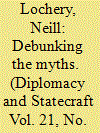

|
|
|
|
|
| Publication |
2010.
|
| Summary/Abstract |
In 1979, little was known about Margaret Thatcher's views on foreign affairs, except that she claimed to have little time for the Foreign Office, regarding it, along with the Treasury, as "bastions of compliancy." One point that did appear clear, at least superficially, during her time as leader of the opposition (1976-1979), and her three governments (1979-1990), was her apparent pro-Israel stance. This viewpoint appeared to be out of sync with the widely held British view, articulated by the Foreign Office, of a preference for the Arabs over the Israelis. This article disproves the idea of Thatcher's apparent pro-Israeli leanings. It uses documentary sources, many of which were gained through the Freedom of Information Act and have never been used before, to outline that during the Thatcher era there was a slide away from Israel and towards the Arabs in British Middle Eastern policy.
|
|
|
|
|
|
|
|
|
|
|
|
|
|
|
|
| 5 |
ID:
101064
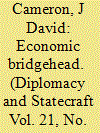

|
|
|
|
|
| Publication |
2010.
|
| Summary/Abstract |
Between 1919 and 1926 Weimar Germany pursued a foreign policy that sought to place Germany in a position to mediate between Soviet Russia and the United States. In particular, Berlin was eager to act as a mediator in the economic and commercial relations between these two powers. Germany hoped that such a policy would align it with two Powers that, like itself, were hostile to the Versailles order. Berlin also hoped that such a relationship would contribute to German postwar economic recovery and thereby to Berlin's re-emergence as a Great Power in the aftermath of its defeat in 1918. This policy culminated in 1925-1926 with Berlin's efforts to arrange for American financing of a 300 million Mark credit to the Soviet Union. Ultimately this and other efforts failed as result of Germany's own financial weakness, Washington's refusal to cooperate with Berlin's initiatives, and the nature of the Soviet economic system.
|
|
|
|
|
|
|
|
|
|
|
|
|
|
|
|
| 6 |
ID:
101067
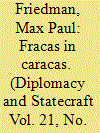

|
|
|
|
|
| Publication |
2010.
|
| Summary/Abstract |
The Eisenhower Administration claimed a diplomatic triumph-and a mandate to overthrow the elected government of Guatemala-after the Tenth Inter-American Conference held in Caracas, Venezuela, in March 1954, when 17 nations voted for an American resolution condemning international Communism. This article disputes the official story and some recent scholarly depictions of the conference. Caracas was the scene of intense Latin American opposition to the American agenda. Vote-buying was rampant as Washington made hundreds of millions of dollars worth of concessions to individual countries. Nonetheless, amendments pushed through by Latin American diplomats transformed the interventionist American resolution into a strong statement against intervention. The American "triumph" was actually a fiasco that called into sharp relief the difference between United States and Latin American understandings of the inter-American system, demonstrating Latin American diplomatic resistance to intervention and the limits of diplomacy's potential to constrain the actions of the most powerful American state.
|
|
|
|
|
|
|
|
|
|
|
|
|
|
|
|
| 7 |
ID:
101062
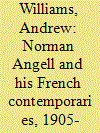

|
|
|
|
|
| Publication |
2010.
|
| Summary/Abstract |
On the occasion of the Centenary of the publication of Norman Angell's The Great Illusion, this article explores the extent to which Angell was influenced by his French contemporaries. He was living in France for the ten years previous to the book's publication and working as a newspaper editor and commentator. The main currents of French political thinking of that period are explored. The main conclusion reached is that Angell had little impact on French thinking at the time and it had not much on him. But it is argued that the reasons for this seeming mutual ignorance had profound effects on the development of thinking about international relations before 1914 and continue to haunt the way we think about IR in the "Anglo-Saxon" countries and in France itself.
|
|
|
|
|
|
|
|
|
|
|
|
|
|
|
|
| 8 |
ID:
101061


|
|
|
|
|
| Publication |
2010.
|
| Summary/Abstract |
This article uses the largely neglected papers of Sir Henry Bulwer, British minister at Madrid between 1843 and 1848, as a prism through which to view the fourth Earl of Aberdeen's handling of Anglo-French relations, in general, and in Spain over the marriages of Queen Isabella and her younger sister the Infanta Luisa Fernanda, in particular, during a critical period. It highlights the fact that developments in the historiograhical context and the recent availability of important private papers have created an opportunity for a detailed and much-needed re-examination of Aberdeen's foreign policy, Conservative foreign policy, and British policy towards Spain in the 1840s.
|
|
|
|
|
|
|
|
|
|
|
|
|
|
|
|
|
|
|
|
|